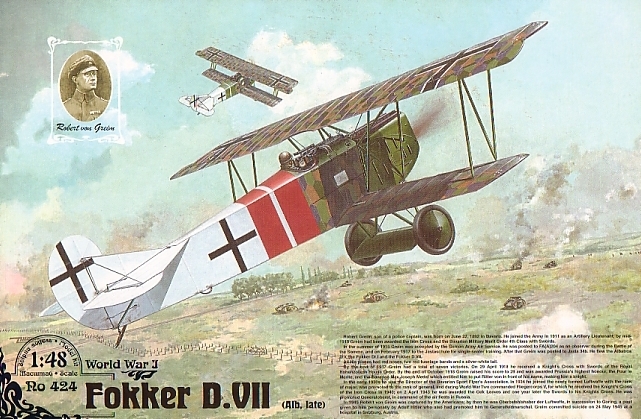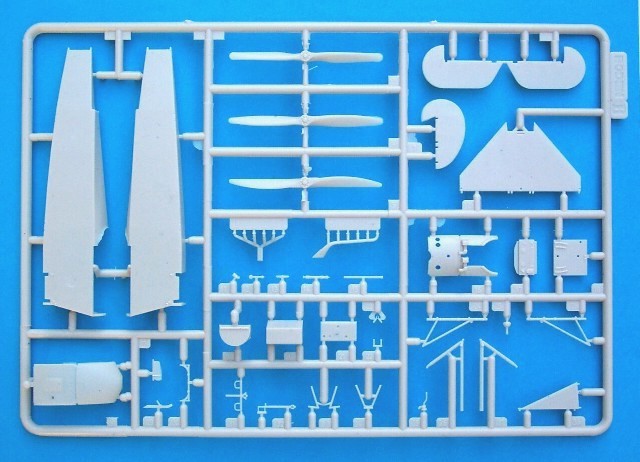|
Fokker D.VII (Alb late)

Roden 1/48
S
u m m a r y
|
| Catalogue Number: |
Fokker D.VII (Alb late) kit #424 |
| Scale: |
1/48 |
| Contents and Media: |
106 parts in injection moulded
styrene; markings for three aircraft |
| Price: |
USD$15.96 from Squadron.com
|
| Review Type: |
FirstLook |
| Advantages: |
Well researched, excellent detail,
option of exposed engine. |
| Disadvantages: |
Short moulding of lower wing,
decals out of register, modification need for aircraft presented. |
| Recommendation: |
Recommended |
Reviewed by Robert Baumgartner

Roden's 1/48
scale Fokker D.VII (Alb late) is available online from Squadron.com
This appears to be Roden’s final incarnation in their Fokker D.VII
family and represents a late Albatros built product.
As with previous releases, sprues V, C, A, and B have been seen before.
The new kid on the block is sprue I. It contains the necessary radiator,
side panels and engine covers that were peculiar to this version.
The louver positions varied greatly from aircraft to aircraft so what
Roden portray is a representation only. It is up to the modeller to
study their subject carefully and remove those that do not apply (or add
for that matter). In saying that, it is unfortunate that a more
characteristic pattern was not chosen.
In all, there are six plastic sprues containing one hundred and six
pieces. The lovely detail has not suffered from the extended use of the
moulds and flash was mainly confined to the runners.

Click the thumbnails below
to view larger images:
Accuracy is not a problem with this series of kits as the outline
matches very well with the latest published material. Here the Albatros
Productions Anthology series is the best reference to date.
One of the features of the kit is the separate engine, and this is a
real treat. It allows the modeller to display the aircraft with the
forward panels off without the need for major scratch building. All
framework is included and this has been moulded as near scale as the
medium will allow.
Naturally care will be needed during assembly and careful study of the
instruction sheet is vital. Some fiddling is necessary but a bit of
patience will reward.
The usual cockpit items are present with only the port side auxiliary
“throttle” lever and ignition control handle to add. There is a good
representation of the tubular structure on the inner sides of the
fuselage. To Roden credit, this has not resulted in any external sink
marks. A couple ejector pins are evident in the cockpit but these are
essentially hidden when the fuselage halves are closed up.
Each of the main wings is moulded in two halves and exhibit very subtle
rib detail. The leading edge ply sheathing is also present and is to the
same high standard.
Stacking pads have been included on the upper wings but are strangely
missing on the lower items. A couple of pieces of sliced plastic rod
will remedy this.
The flaw that affected the bottom wing on earlier releases still makes
an appearance here. Basically it’s a slightly short moulding that forces
the modeller to reinstate some of the trailing edge scallops.
The lower wing “spar” will ensure a tight fit into the fuselage and if
one is not careful, some anhedral will result. A swipe or two with the
sanding stick will help.
The struts are very thin and as a result of their scale-like appearance,
do need some delicate handling. This is also reflected in the fitting of
the top wing but the results are well worth it.
The usual smattering of spare parts arises from the common sprues and
all are very welcome.
Three options are catered for and these are supplied in six sheets of
decal. One is dedicated to the National markings and stencil data, with
the others being for the rib tapes and lozenge. It’s good to see that
the latter is not in the garish colours one usually sees in kits of this
type.
One of the sheets was out of register but thankfully this did not affect
the personal markings which were in a single colour. The carrier film is
thin and a test sample from the unusable Balkenkruez showed that the
decal behaved admirably.
Interestingly, some of the options chosen by Roden are not able to be
built straight from the box. The final version of radiator is supplied
and yet two of the three decal options have the earlier central mounted
filler cap which is not supplied!
Note that modification is also necessary for the correct louver
positions worn by these machines.
Click the thumbnails below
to view larger images:
Marking options are:
1. Fokker D.VII (Alb) flown by Obt. Robert von
Greim, Jasta 34b, 1918
Usually credited with 28 victories, Robert Ritter von Griem
survived World War I to later join the Luftwaffe in the second great
conflict. He was captured by the Americans in 1945 and soon after
committed suicide.
2. Fokker D.VII (Alb) flown by Ltn Frodien,
Jasta 40, 1918
“Silvery white is a more precise description of the fuselage
colour, than the “grey” specified in the painting guide. Many of
Jasta 40’s D.VIIs can be seen with the upper part of the engine
exposed due to the removal of panels, this one included.
3. Fokker D.VII (Alb) flown by Ltn. Willi
Rosenstein, Jasta 40, 1918
Modellers should note that this aircraft was photographed with a
tubular gun sight. Also seen on the port interplane strut is an
anemometer – type ASI. As per the machine above, the engine cowlings
were removed.
Willy Rosenstein ended the war with 9 victories but tragically died
in a mid air collision with a student pilot in 1949.
Roden's 1/48 scale Fokker D.VII kits come with a wealth of detail and
only the limitations of the builder will prevent an outstanding replica
from being made.
As a result, they require a bit more care in assembly and the adage of
“measure twice, cut once” certainly applies.
Recommended.
Thanks to
Squadron.com for the review
sample.
Review and Images Copyright © 2005 by
Robert Baumgartner
Page Created 08 August, 2005
Last updated 08 August, 2005
Back to HyperScale Main Page
Back to Reviews Page
|
Home | What's
New | Features
| Gallery |
Reviews | Reference
| Forum
| Search